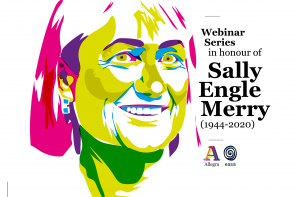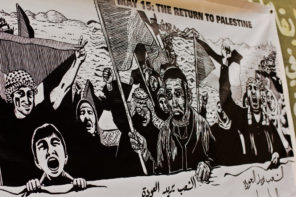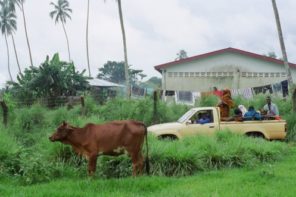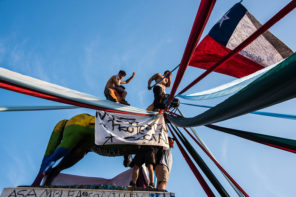Our students do not dream of global change anymore!
It is on these pessimistic words that Alessandro Monsutti opened our workshop « The Bureaucratization of Utopia: International Governance, Audit Cultures and Administrative subjectivities in the 21st Century », organized at the Graduate Institute in Geneva on June 29-30 in collaboration with Allegra Lab. During these two days, and with the financial support of the Swiss National Sciences Foundation, twelve anthropologists and one historian from Switzerland, the UK, the US, Finland, Germany and France gathered to discuss the interplay between utopia and bureaucracy and to track the possibility of hope in the cracks of the global administrative processes that are their object of study.
The idea for this workshop came from a shared intuition that our world had reached a « post human rights » (hence a « post Utopian ») moment when the great ideals of the 21st century were gradually subsumed behind standardized formats and procedures. It also emerged out of the realization of a certain disconnect between the progressive ideals upheld by institutions of global governance and the rather dull nature of the bureaucratic labour that constitutes their everyday. Building on Anna Tsing’s last book The Mushroom at the End of the World, in which the author argues that precarity, indeterminacy and absence of control have become distinctive features of our time, Julie Billaud introduced the workshop by asking whether global governance could also be conceived as an inherently fragile field instead of a totalizing form of power.
Because International Organizations have a limited influence on the actions of states and on transnational corporations, because ‘well established procedures can be incapacitated’ (Niezen et Sapignoli 2017) due to an absence of adequate resources or the resistance of states to comply with them, and because the political field in which they operate is so scattered across space and time, the actions they initiate are narrowly circumscribed.
These vulnerabilities both call into question the ideology of permanent progress on which global governance is grounded but simultaneously opens room for ‘world-making’ beyond international governance’s direct scope of influence and beyond its official intentions.
In this sense, anthropology as ‘the art of noticing’ (Tsing 2015), Billaud argued, is well equipped to look into the ‘cracks’ of international bureaucracies and reveal what such cracks enable and disable, and the kind of world(s) they contribute to create. This anthropological imagination can provide us not only with effective theoretical tools to analyse the hopes and frustrations that global governance triggers but also with a hopeful method (Miyazaki 2006) for making our discipline more relevant in the field of international studies.
* * *
In his presentation, Lukas Schemper explored the emergence of “altruistic communities” in the context of natural disasters. By tracing the history of the International Relief Union, an initiative launched by Giovanni Ciraolo – the President of the Italian Red Cross in the 1920s – Schemper demonstrated how early humanitarian endeavours gradually moved away from religious notions of charity to embrace the law as a means to universally implement justice. However, as the IRU scheme advanced in the bureaucracy to finally enter the League of Nations, the initial grand vision of its founder (international insurance scheme, emergency relief army) was radically watered down. Scattered across three bureaucracies (the International Committee of the Red Cross, the League of Red Cross Societies and the League of Nations), the IRU originally designed to channel international solidarity turned into a mere coordination mechanism between organizations which themselves faced serious management issues and which competed against each other. This exemplary case of bureaucratization of an ideal reveals how utopias always reflect the mind-set of the era in which they emerge. In this sense, the utopias of the inter-war period concretized through the establishment of a number of international institutions, reflected the belief that the world could be rationalized at a minimal cost via bureaucratic management.
Miia Halme-Tuomisaari offered a chronology of the ‘global human rights phenomenon’ delineating a gradual move away from the utopia of a ‘human rights world’ following World War II to the current normalization of human rights as a form of ‘business as usual’, what she calls the ‘banalization of the good’. She emphasized the paradoxical subjectivities of modern days human rights bureaucrats: “passionately engaged” (like the scientists studied by Bruno Latour) in the cause of promoting human rights, they simultaneously have to remain “objectively detached” (like the lawyers working at the French Conseil Constitutionnel, another object of Latour’s study) in order to maintain an image of professionalism and impartiality. Because of their constant efforts at depersonalizing the content of the documents they produce, Halme-Tuomisaari pondered on the possibility of studying UN subjectivities in a context where ‘everyone is a somebody but no one is really anybody’. In an attempt to bring nuance to Herzfeld’s archetype of the ‘burned out bureaucrat’ (Herzfeld 1992), she suggested a typology of characters she encountered during her fieldwork at the UN Human Rights Committee: “the aspiring UN type” (the intern), “the old timer” (whose long time experience within the UN system enables him to maintain a vision of ‘permanent progress’), “the NGO advocate” (who constantly struggles to make her voice heard in a forum primarily organized around states), and the “guardian of vision” (the UN insider, academic, expert who is also a believer). If cynicism and frustration are feelings commonly shared among UN bureaucrats, Halme-Tuomisaari’s presentation gave the opportunity to reflect on their inner meaning: is cynicism the photographic negative of belief, as Lori Allen suggests in the case of the human rights activists working in Palestine (Allen 2013)?
Is cynicism what precisely creates attachment, especially for those who ‘master’ the field of human rights? What do these subjectivities tell us about power and hegemony?
This is a question Andrea Ballestero tried to answer in her reflection on ‘humanitarian water and techno-legal devices’ in Costa Rica. Since the turn of the new millennium, the realization that drinkable water would soon be lacking led a number of actors, including Hollywood stars, church groups, governmental officials, and everyday citizens to campaign to define water as a human right. This endeavour further manifested itself at the World Water Forum in Mexico in 2006. While the Forum was an opportunity to disseminate knowledge, it was also a stage for making techno-legal devices circulate. These devises turned water into a human right via the use of statistics. As “material frontlines of norms” (Redfield 2016) such devices bear the traces of postcolonial and capitalist erasures, embracing market logic while conveying laudable moral affects in the goal of improving human welfare. Looking at a) a formula, b) an index and c) a list devised by Costa Rican bureaucrats in charge of implementing ‘the right to water’, Ballestero argued that the future-making capacities of humanitarian mobilizations are deeply intertwined with these legal, epistemic, and economic artefacts. Because their actions are limited by existing structures, technocrats’ capacity to project themselves in the future is severely constrained. Unable to carefully craft an image of the world they are in charge of creating, bureaucrats’ vision of the future remains ‘non-cinematic’, reflecting their commitment to action for lack of political capacity to devise interventions.
Does this example illustrate the broader eviction of politics within the realm of global governance? Or is it a story of politics taking different forms?
The case of negotiations around Weapons of Mass Destruction (WMD) free zones in the Middle East presented by Gregoire Mallard highlighted similar strategies of apparent depoliticization. By using what Mallard calls ‘forward analogies’ (when Europe’s past-present relation is compared to the Middle East’s present-future relation), track 2 diplomats turn highly political negotiations into a forum for knowledge sharing via exchanges of ‘failures’ and ‘bad practices’. This narrative strategy enables them to constitute the Middle East in contra-distinction with Europe, to avoid raising the issue of Israel’s nuclear capacity and opening their own past to scrutiny. Indeed, such simulations help “constitute” the reality of regional orders when their ontological status as objects of deliberation and intervention is problematic.
Bringing insights from her fieldwork at the UN High Commissioner for Refugees, Giulia Scalettaris questioned the implicit assumption behind the workshop, namely the disconnect between bureaucracy and utopia. Indeed, bureaucracies are also an effective medium through which to organize collective action. Because current austerity measures call for the downsizing of public services (including universities) everywhere, we have to be wearied of discourses that use stereotypical depictions of bureaucracies – as inherently ineffective and burdensome – in order to support neoliberal policies.
It is therefore necessary to make a distinction between bureaucracies that seek to deliver the common good and other bureaucratic processes (such as audits and other measurement techniques) that have deeply transformed the nature of administrative work, turning bureaucracies onto themselves in order to justify their own existence.
Observing the ways in which organizations discursively construct utopias while systematically failing to implement them – taking into account the fact that in spite of these failures organizations continue to expand and gather support – could be a productive starting point for research. The borders of bureaucracies, Ballestero added, may be the right location from which to observe the unintended effects of administrative processes and to move away from the narrative of their inherent slowness so as to also conceive these forms of endurance as “weapons of the weak” in the face of quick neoliberal reforms.
Nayanika Mathur took the examples of accountability measures implemented in India since the 2000s – notably the Right to Information Act, the social welfare legislation and the ‘digital India’ plan – to highlight some of the paradoxical effects of the ‘tyranny of transparency’ (Strathern 2000a). Forced to produce an incessant flow of documents in a process that conflates accounting for accountability (and which is therefore ‘extractive’ by nature), Indian civil servants find themselves caught in the dynamics of ‘deeper Weberian bureaucratization’ that the Right to Information Act was initially meant to reform. Meanwhile, the utopian move to digitally mediated forms of interactions between citizens and the state in a context where such technologies do not yet exist has the ironic effect of making the seemingly benign public goods of transparency and accountability usher in a dystopic present.
Maria Sapignoli further explored the double edge nature of bureaucratic processes which respond to ‘transparency’ and ‘participation’ imperatives via her ethnographic study of UN initiatives for indigenous people. Representatives of indigenous people engaging with UN processes find themselves caught in a bind between their aspirations as ‘believers’ and their duty to reach measurable goals as ‘experts’. The legal technologies mobilised in order to create institutions and documents that represent “collective patterns of intention”, while enlarging the field of participation, also trigger an iterative process that is structured by the field itself and which ultimately tends to erase indigenous people’s voice. In spite of these structural constraints and the frustrations they produce, indigenous groups continue to engage with the UN in the hope to see the conditions of their communities improve.
Sapignoli qualified this continuous engagement as a desperate attempt to saturate the UN with indigenous people’s own language – as a form of ‘hopeful disenchantment’.
Building on her 40-year long work experience with indigenous people, Isabelle Schulte-Tenckhoff argued that the ‘mainstreaming’ of indigenous people’s issues within the UN system has initiated a shift from ‘people’ to ‘issues’ and a simultaneous de-radicalization of their agenda. Paradoxically, the increased participation of indigenous groups in UN processes (including their recent inclusion within the General Assembly) has watered down their initial claims for self-determination. These dynamics reflect the broader transformation of the UN from its initial diplomatic mandate, to a more bureaucratic organizational form from the 1990s onward, and into a meeting place for NGOs, academics and civil society organizations: what Thomas Weiss calls ‘the third UN’ (Weiss, Carayannis, et Jolly 2009). However, participation is hardly a neutral exercise. While the UN Working Group on indigenous people created in 1981 was, according to Tenkhoff, inclusive and utopian, now the UN seems to have created its own elite. Participation has therefore been a means to ‘domesticate’ indigenous people’s claims. By creating a fellowship program on the occasion of the First Decade of Indigenous People, the UN has trained them on how to play by the rules of the system.
Tenckhoff’s account is a powerful reminder of the standardizing power of international governance, which raises questions about the capacity of liberal spaces to produce radical thinking.
With Shaila Galvin’s presentation, we moved to the governance of organic farming in India, via the case of an agrarian utopia located in the Himalaya. The certification process of organic rice mostly relies on documents produced by farmers themselves as well as interviews conducted by auditors. Auditors’ reliance on the oral and the written form means that the idea of organic agriculture is disconnected from what is found in the food. Compliance is measured according to documents and according to farmer’s accounts of their agricultural practices, which are taken at face value. Ultimately, the document is the object of the certification and certification becomes a means to create a different form of utopia. This example demonstrates that because audit processes primarily rely on auditees’ self-reporting practices, such mechanisms are inherently instable: they seek to evaluate farmers’ efforts to comply instead of assessing the organic quality of the food itself.
Elif Babul further explored opacities produced by standardization processes via her ethnography of human rights training and bureaucratic reforms in Turkey. In a context where the language of human rights is perceived as subversive and where socialist politics is banned, the ‘streamlining’ of human rights has the paradoxical effect of creating frustrations. In order to neutralize these tensions, human rights have to be made relevant to be taught to different groups of people. Presented as sets of rules and ideas necessary for bureaucrats to consider in order to become professionals, civil society trainers have to use the politics of the apolitical to speak to the State. These efforts of ‘translation’ have nevertheless made human rights even more foreign to their target audience. The use of performances such as role-plays during which secrets and failures are shared creates a form of bureaucratic intimacy that tends to make participants embarrassed and frustrated. Simultaneously the training program contributes to the emergence of a shared understanding among bureaucrats and civil society partners of the need to dissociate themselves from human rights in case the political tide turns.
The case of Greece’s involvement in its first Universal Periodic Review (UPR) – a human rights monitoring mechanism of the UN Human Rights Council – in 2011, at a moment of economic collapse and drastic cuts in public expenditures, is another illustration brought by Jane Cowan of the selective visibility enabled by human rights auditing. During its first review, Greek citizen’s endangered access to food, health, water, shelter, decent wages and working conditions were not mentioned and only concerns regarding the rights of migrants, refugees, and occasionally of Roma were raised. The reasons given for such an ‘absence’ were several but lack of time for NGOs, the National Human Rights Commission and state institutions to prepare their reports was a major factor. At its second review in 2015, however, Greece – under a new government more inclined to challenge austerity measures imposed by the troika – used a different strategy. Both civil society organizations and state institutions used the UPR to evaluate the human rights consequences of Troika-imposed austerity measures, as part of a longer effort to alter austerity policy. By sharing the responsibility of human rights violations with its international partners (European Commission, European Central Bank, and International Monetary Fund), the Greek delegation used the ‘audit’ not only as a means to review its own human rights performance but also as an opportunity to denounce the unfair governance regime to which it was subjected.
Julie Billaud pushed the conversation on ‘audit cultures’ (Strathern 2000b) further by comparing the monitoring practices of the UN Human Rights Council to the ones of the International Committee of the Red Cross. While highlighting fundamental differences between the two organizations – notably in their respective perceptions of the future – Billaud also identified converging trends – notably 1) the reliance on ‘constructive dialogue’ (UPR) or ‘confidential dialogue’ (ICRC) to foster compliance, 2) the importance of the predictability of procedures in insuring states’ collaboration and 3) a push toward a greater use of quantitative data and statistics in the manufacturing of ‘evidence’.
* * *
As Alessandro Monsutti rightly argued to conclude the workshop:
“In a post-, post-Cold War world, all the utopias and the dreams that moved people in the 90s are still around, floating in the vocabulary of many UN agencies and NGOs but these ideas probably don’t make people dream anymore. The workshop was a means to explore the everyday practices of these ‘bureaucrats of big ideas.”
Through the various ethnographic cases they explored, participants were able to highlight the tensions, contradictions and paradoxes that bureaucrats encounter when seeking to implement ‘good governance’ principles (such as ‘transparency’, ‘accountability’, ‘participation’). Their contributions also underlined the ubiquitous presence of audit and other measurement techniques in the global governance of the world, forcing the various actors interacting in this field to develop administrative skills in order to preserve their audibility and remain relevant. What these trends seem to highlight is the increasing reliance on ‘techno-legal devices’, to use Ballestero’s notion, (reports, indicators etc) to solve big world issues and to ‘neutralise’ politics. But shouldn’t we rather conceive these dynamics as another expression of politics, the mere ‘gloss of harmony’ (Müller 2013) covering inherently political – and therefore controversial – issues? Aren’t the frustrations of international experts and bureaucrats also a reflection of their genuine commitment to ‘do the good’ in spite of the myriad procedures that constantly limit their agency?
References
Allen, Lori. 2013. The Rise and Fall of Human Rights: Cynicism and Politics in Occupied Palestine. Stanford University Press.
Herzfeld, Michael. 1992. The Social Production of Indifference: Exploring the Symbolic Roots of Western Bureaucracy. Chicago: University of Chicago Press.
Miyazaki, Hirokazu. 2006. The Method of Hope: Anthropology, Philosophy, and Fijian Knowledge. Stanford University Press.
Müller, Birgit. 2013. The Gloss of Harmony: The Politics of Policy Making in Multilateral Organisations. Pluto Press.
Niezen, Ronald, et Maria Sapignoli. 2017. Palaces of Hope: The Anthropology of Global Organizations. Cambridge University Press.
Redfield, Peter. 2016. « Fluid Technologies: The Bush Pump, the LifeStraw® and Microworlds of Humanitarian Design ». Social Studies of Science 46 (2): 159‑83. doi:10.1177/0306312715620061.
Strathern, Marilyn. 2000a. « The Tyranny of Transparency ». British Educational Research Journal 26 (3): 309‑21.
———. 2000b. Audit Cultures: Anthropological Studies in Accountability, Ethics and the Academy. Routledge.
Tsing, Anna Lowenhaupt. 2015. The Mushroom at the End of the World: On the Possibility of Life in Capitalist Ruins. Princeton University Press.
Weiss, Thomas G., Tatiana Carayannis, et Richard Jolly. 2009. « The “Third” United Nations ». Global Governance: A Review of Multilateralism and International Organizations 15 (1): 123‑42. doi:10.5555/ggov.2009.15.1.123.









